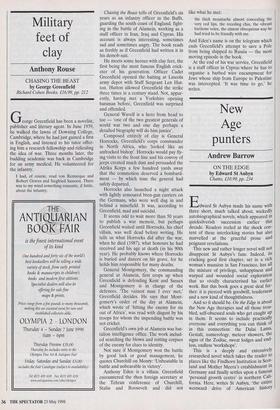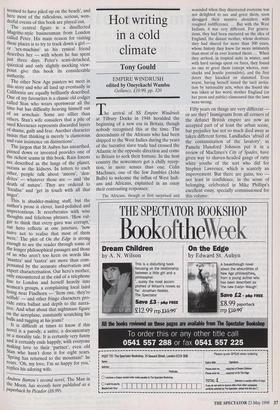New Age punters
Andrew Barrow
ON THE EDGE by Edward St Aubyn Chatto, £10.99, pp. 234 Edward St Aubyn made his name with three short, much talked about, wickedly autobiographical novels, which appeared in quicksilverish succession earlier this decade. Readers reeled at the shock con- tent of these interlocking stories but also marvelled at the graceful prose and poignant revelations. This new and rather longer novel will not disappoint St Aubyn's fans. Indeed, its cracking good first chapter, set in a rich woman's mansion in San Francisco, has all the mixture of privilege, unhappiness and warped and wounded social exploration that so vividly characterised his earlier work. But this book goes a great deal fur- ther: it is pierced with goodwill, tenderness and a new kind of thoughtfulness. And so it should be. On the Edge is about the New Age therapies and all those trou- bled, self-obsessed souls who get caught up in them. It seems to include practically everyone and everything you can think of in this connection: the Dalai Lama, Gestalt, numerology, meteor showers, the signs of the Zodiac, sweat lodges and end- less, endless 'workshops'. This is a deeply and extensively researched novel which takes the reader to places like the Findhorn Institution in Scot- land and Mother Meera's establishment in Germany and finally settles upon a famous `personal growth centre' in northern Cali- fornia. Here, writes St Aubyn, 'the entire westward drive of American history seemed to have piled up on the beach', and here most of the ridiculous, serious, won- derful events of this book are played out. The central figure is a disaffected Magritte-style businessman from London called Peter. His main reason for visiting these places is to try to track down a girl or 'sex-machine' as his cynical friend describes her — with whom he has spent Just three days. Peter's semi-detached, quizzical and only slightly mocking view- point give this book its considerable authority. The other New Age punters we meet in this story and who all land up eventually in California are equally brilliantly described. One of my favourites is a classic old codger called Stan who wears sportswear all the time but has difficulty heaving himself out of an armchair. Some are sillier than others. Stan's wife considers that a pile of used Kleenexes represents discarded layers Of shame, guilt and fear. Another character insists that thinking is merely 'a clamorous and vain insistence on distinctions'.
The jargon that St Aubyn has unearthed, pinned down or invented provides one of the richest seams in this book. Rain forests are described as the lungs of the planet, oceans as the kidneys. In letters to each other, people talk about 'axions', 'den- drites' — whatever those are — and 'the death of nature'. They are ordered to focalise' and 'get in touch with all that anger'.
This is shudder-making stuff, but the author's prose is clever, hard-polished and unpretentious. It reverberates with wise thoughts and felicitous phrases. 'How vul- gar to think that every guru was corrupt,' our hero reflects at one juncture, 'how naive not to realise that most of them were.' The plot of On the Edge is strong enough to see the reader through some of the longer philosophical passages and those of us who aren't too keen on words like mantra' and lantra' are more than com- pensated by the accurate observation and expert characterisation. Our hero's mother, Only encountered at the end of a telephone line to London and herself heavily into Women's groups, a complaining local laird living near Findhorn — 'Item one, they're selfish' — and other fringe characters pro- vide extra ballast and depth to the narra- tive. And what about that nightmare figure on the aeroplane, constantly scratching his balls and tugging at his jeans? It is difficult at times to know if this novel is a parody, a satire, a documentary or a morality tale. It is certainly very funny and it certainly ends happily, with everyone making love to their 'partner', even old Stan who hasn't done it for eight years. SPring has returned to the mountain!' he roars. 'Oh, my love, I'm so happy for you,' replies his adoring wife.
Andrew Barrow's second novel, The Man in the Moon, has recently been published as a paperback by Picador (£6.99).



































































 Previous page
Previous page